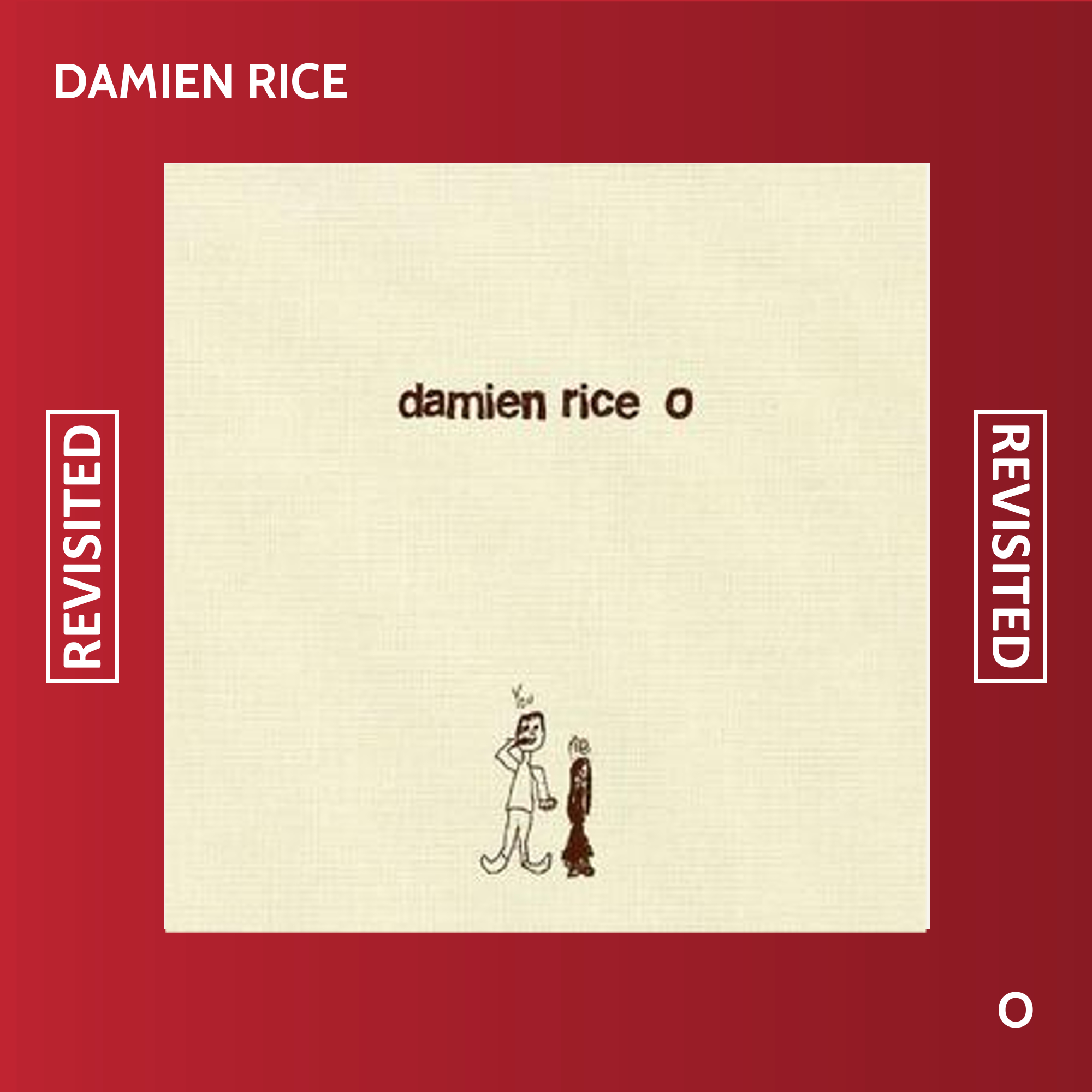In the next installment of our series exploring classic Irish albums, Taylor Johnson digs out his Dad’s battered copy of Damien Rice’s debut O. Often celebrated as one of the greatest folk albums of the noughties, he asks the question – was it really that good?
“I don’t want to be huge, I want to be cherished.”
If you can, cast your mind back to early 2002. The 9/11 terrorist attacks have just changed things forever. An age of innocence is over, as the world trips over itself in the dark, looking for a light switch. Damien Rice stands on a Dublin street corner with his guitar, preparing for the release of his debut record. His previous band Juniper had split due to artistic differences and he was out on his own now. Like everyone else, the Kildare songsmith was in search of a new normal, having spent the previous year on a Tuscan farm, writing songs to pass the time. He had busked his way across Europe too, getting acquainted with foreign cultures and new ways of living; themes that would become increasingly relevant as the millennium unfolded.
The songs Rice had been writing in Italy would become O, an album now celebrated as one of the greatest Irish folk releases of all time. It would win the Shortlist Prize for Artistic Achievement (essentially the American Mercury Prize) and launch him to global fame.
Not since Elliot Smith had the world heard such a fragile voice. The accompaniment of a young Lisa Hannigan became the crux that sustained O’s timeless qualities, fresh out of university and with her own voice as clear as the cold water they sing about toward the album’s end. Their voices together, that relationship unfolding before us on record—this was the human element that made those songs stand out amongst every other singer-songwriter at the time. Still, Damien Rice was never interested in success, even turning down an interview with Rolling Stone magazine because he was embarrassed at having his face in print. “I’m understanding that these things increase exposure and that’s a good thing,” he told the music site Toazted after a gig in Amsterdam in 2002, “…but I also know that if everyone is aware of it, then it’s not as valuable, or special, or beautiful as it was before.”
Try as he might, Damien Rice couldn’t hold back the flood of adulation sparked by O, and as the years went by, he became an increasingly elusive figure. A lot of that shyness is captured on opener Delicate, a gentle, acoustically strummed ode to a lover he wants to make out with when no one’s around. His voice rises and falls with the strings around him, the quietly confessional first half giving way to a painfully passionate ending that has Rice gripping to his guitar for dear life. 18 years on, it still sounds as vital and real as the day it was written.
Volcano is a darker beast, as if plucked directly from the mouths of a warring couple sat in a Dublin boozer. The meandering cello lines and overlapping boy/girl vocals give the song an eerie, uncomfortable presence. Still, the melody is so intoxicating, so richly hummable, it remains an undoubted album highlight. As Rice’s final line trickles into The Blowers Daughter, it becomes clear that this is a voice of exceptional talent. ‘…Daughter’ is an enigmatic ode to another lost love he can’t take his eyes or mind off (well, until he finds somebody new at least – as that controversial final line dictates). Damien Rice doesn’t try to hide the fact that he can be a bit of a bastard, and this album sounds better for his honesty.
The production in O sits somewhere between pub-busker minimalism and seismic grandeur. So strong is this record’s opening that it feels cinematic. The final part of the 3 track opening trilogy is Cannonball, Ireland’s answer to Tracy Chapman’s Fast Car and a top 10 charting single in the UK. You know the one.
Older Chests is perhaps the most obviously Italian composition on O’s tracklist. It sounds like Rice is sitting in a Tuscan farmhouse, lamenting time and all its follies. Soundbites of children playing and bustling villages trickle in and out of the verses, adding texture like the New York night on Tom Waits’ Closing Time. When Lisa Hannigan takes the reins towards the final verse, it’s as if she’s literally picking the song off the floor where Rice left it. Like he’d walked out of the room and already moved on to the next tune.
By the time Amie is born, there’s no going back. On those first 5 songs alone, Rice had himself a classic. The string section at Amie’s end, left on their own to carry the song home, sounds straight out of a nature documentary. The stirring burst of the chorus, ‘Amie, come sit on my wall and read me the story of O’ remains as moving as it’s always been. There’s no time for interludes however, as he leads you by the hand straight into Cheers Darlin’, the rambling story of Rice trying it on with a woman he’s met down the pub. Unfortunately, she only remembers to mention her boyfriend after he invites her back to his place. With the sincerity stripped away, our young protagonist comes across bitter and heartbroken, but not in a good way. Though Cheers Darlin’ sounds far more engaging now than it did to my child’s ears at the time, when compared to the tracks we’ve just heard, it lacks the same pop nous.
Cold Water is another track that I hated as a kid. My Dad would sing the opening lyrics in place of an alarm clock in the mornings before school (it was a weird house to grow up in). Listening today, the low rumbling voices brought in under Hannigan’s voice still sound unnecessary and weird. It doesn’t go anywhere particularly fast, though in its defense, I will always associate this song with double maths on a Monday morning.
The finale to O feels as quiet and reflective as its author wanted the whole album to be. Until I Remember’s cataclysmic middle section, the song feels claustrophobic and burdened. When it erupts, it does so not to the same standard as what has come before it. When you open an album with 5 massive songs, this will always be the risk you take.
In contrast, closer Eskimo manages to tie up O’s loose ends with all the ease of an Italian sunset. Over a curious rhythm, Rice finds himself reaching out to his muse to help end a bout of writer’s block. Irish opera singer Doreen Curran provides the startlingly beautiful finale O threatened and teased from those first gentle strums of Delicate.
Bar one or two discrepancies towards the end, O stands tall as an essential Irish record. Lisa Hannigan sounded fearless and unguarded, Rice (for the most part) unencumbered by the weight of his songs at this point.
“If everybody had diamonds, why would anyone want diamonds? Why would diamonds be so special? I want my music to be cherished by the people who have it.”
Even with the world entranced, Damien Rice’s art remains special. Cherished, even.
8/10








